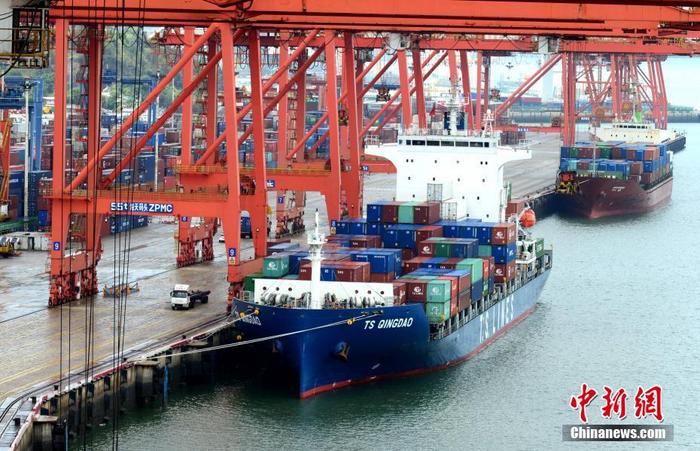Data map: container terminal.
Photo by China News Agency reporter Wang Dongming
(Financial World) The G20 trade "rising" sounded by the British "orders" is it an accident?
China News Service, Beijing, May 26 (Liu Liang) The Group of Twenty (G20) international trade report card for the first quarter of 2021 has been released.
Amidst the "rising" of trade, the UK's data seems to be somewhat unexpected.
According to data released by the Organization for Economic Cooperation and Development (OECD), the G20 international trade in goods in the first quarter of this year set a record, breaking through 3.97 trillion U.S. dollars and 4.02 trillion U.S. dollars, respectively, an increase of 8.1% compared with the fourth quarter of 2020. And 8.0%.
Under the situation that the imports and exports of G20 member countries' international trade in goods rose almost across the board, the United Kingdom became the only "exception". In the first quarter, both imports and exports experienced negative growth, down 10.5% and 5.7% respectively.
Although the UK's trade data for the first quarter may seem "accidental", there are actually traces to follow.
Among them, in addition to the impact of the global pandemic on economic and trade activities, the impact of the UK’s “Brexit” factors should not be underestimated.
Since Britain officially "Brexit" for more than a year, its import and export trade with its traditional European trading partners have been affected to varying degrees.
According to official British data, the total trade in goods between the UK and EU countries in the first quarter of this year fell by 23.1% compared to the first quarter of 2018, while trade with non-EU countries fell by only 0.8%.
At the same time, this is the first time since 1997 that the total amount of goods imported by the UK from non-EU countries is higher than that of EU countries.
Since the beginning of this year, the UK's "Brexit" effect has continued to ferment, and its economic and trade activities with its traditional trading partners such as France and Germany have clearly "cold".
Official French data show that in January, French exports to the UK fell by 13% from the average level of the previous six months, and French imports from the UK also fell by 20%.
During the same period, France's total imports and exports to other countries increased compared with the previous month.
"Trade with Britain was interrupted by Britain's'Brexit'", the French official explained.
Although the trade between the two countries has gradually recovered from the epidemic, the latest data show that the frictional barriers and uncertainty brought about by Britain’s “Brexit” still have a significant impact on the economic and trade activities between the UK and EU countries.
According to the British Financial Times, although the UK and the EU reached a trade agreement at the “last minute” to avoid tariffs on most commodities, the trade is still subject to higher transportation costs, transportation delays, health certification requirements and borders. Interference with complex customs requirements.
It is reported that some rough processed goods imported into the UK and then exported to the EU market are still subject to tariffs.
According to official German data, German exports to the UK in January fell by about 30% year-on-year, continuing the downward trend in trade between the two countries since the 2016 UK “Brexit” referendum.
In addition, Italy's exports to the UK in February fell by 38% year-on-year, and its imports from the UK in January fell by 70% year-on-year. The decline in both data was much higher than that of Italy to other countries.
In fact, the British authorities may have anticipated a decline in trade.
On February 1 this year, the United Kingdom announced that it would formally apply to join the "Comprehensive and Progressive Trans-Pacific Partnership Agreement" (CPTPP) in order to seek to expand its economic and trade "friend circle."
According to the analysis by scholars at the time, Britain joined the CPTPP to avoid the marginalization of trade after “Brexit” and to make up for the potential losses caused by “Brexit”.
Right now, "Brexit" is already "the bow without turning back."
Regarding how the UK trade will develop in the future, Chen Fengying, a researcher at the China Institute of Modern International Relations, said in an interview with a reporter from China News Agency that it is still difficult to predict. Although the CPTPP has attracted many economies to join, the current member economies are relatively large. Small, it is difficult to directly promote large-scale trade exchanges in the short term.
At the same time, it is difficult for CPTPP to completely replace the huge trade advantage of the EU single market.
Chen Fengying said that although the UK's trade in goods decreased in the first quarter, the short-term decline in trade in goods may not have as much impact on the overall economy of the UK as expected.
The British economy is supported more by service industries such as finance and tourism.
OECD data shows that the UK's service trade growth rate was slow in the first quarter, but exports still achieved a positive growth of 1.3%, and the total service trade volume was also significantly higher than other economies.
(Finish)

